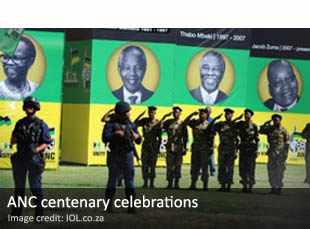CIA tip led to Mandela’s fateful 1962 arrest, claims US ex-diplomat
May 16, 2016 Leave a comment
 The arrest of Nelson Mandela in 1962, which led to his 28-year incarceration, came after a tip from the United States Central Intelligence Agency, according to an American diplomat who was in South Africa at the time. At the time of his arrest, Mandela was the head of uMkhonto we Sizwe (MK), an organization he founded in 1961 to operate as the armed wing of the anti-apartheid African National Congress (ANC). But the white minority government of South Africa accused Mandela of being a terrorist and an agent of the Soviet Union. The US-Soviet rivalry of that era meant that the ANC and its leader had few supporters in America during the early stages of the Cold War.
The arrest of Nelson Mandela in 1962, which led to his 28-year incarceration, came after a tip from the United States Central Intelligence Agency, according to an American diplomat who was in South Africa at the time. At the time of his arrest, Mandela was the head of uMkhonto we Sizwe (MK), an organization he founded in 1961 to operate as the armed wing of the anti-apartheid African National Congress (ANC). But the white minority government of South Africa accused Mandela of being a terrorist and an agent of the Soviet Union. The US-Soviet rivalry of that era meant that the ANC and its leader had few supporters in America during the early stages of the Cold War.
Mandela was arrested on August 5, 1962 in the KwaZulu-Natal town of Howick by members of the South African Police. He was pretending to be the chauffeur of Cecil Williams, a white member of the ANC who was riding in the back seat of the car that Mandela was driving that night. The details of what led to Mandela’s arrest have always been mysterious, and the ANC has long suspected that the MK leader was betrayed by informants placed within the organization by the apartheid government. But an article in the London-based Sunday Times has said that it was the CIA that tipped off the South Africans about Mandela’s whereabouts that night. The claim is based on an interview with Donald Rickard, an American diplomat —now dead— who was serving as Washington’s vice-consul in Durban at the time of Mandela’s arrest. Some believe that Rickard was actually a CIA officer posing as a diplomat until his retirement from the service in 1978, and he himself never denied it.
Two weeks before he died, Rickard gave an interview to British filmmaker John Irvin, who was filming for his latest documentary, entitled Mandela’s Gun, about Mandela’s role in the MK. According to The Times, the former US diplomat told Irvin that in the early 1960s Mandela was “the most dangerous communist anywhere outside the USSR”. This is despite Mandela’s repeated denials that he had ever been a member or sympathizer of the South African Communist Party, which at the time was actively supporting the ANC. Rickard allegedly told Irvin: “I found out when [Mandela] was coming down and how he was coming […]. That’s where I was involved and that’s’ where Mandela was caught”. In his interview, Rickard insisted that Mandela was “completely under the control of the Soviet Union [and effectively] a toy for the communists”. Moreover, he said the CIA believed that he was planning to organize the large Indian population of Natal Province and incite them into an uprising led by communists, which, according to Rickard, could have prompted an armed Soviet invasion of South Africa. The former diplomat is quoted as telling Irvin: “We were teetering on the brink here and it had to be stopped, which meant Mandela had to be stopped. And I put a stop to it”.
Following his arrest, Mandela served nearly 30 years in prison on terrorism charges, until his eventual release in 1990. In 1994, he was elected as South Africa’s first black president, a post he held until his retirement in 1999. The US, which officially designated Mandela a terrorist in the 1980s under the administration of US President Ronald Reagan, kept the ANC leader on its terrorism watch list until 2008.
The US government has refused comment on Rickard’s claims.
► Author: Joseph Fitsanakis | Date: 16 May 2016 | Permalink













